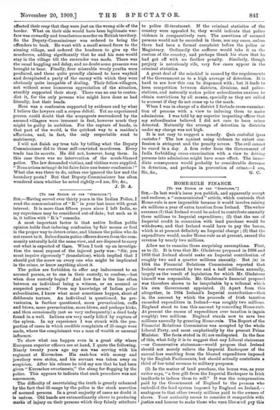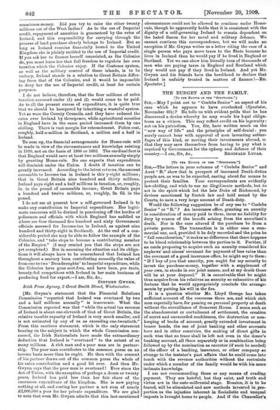HOME-RULE FINANCE.
[To viz EDITOR Ow THE " SPILOTAT010]
last week's issue you publish, and apparently accept and endorse, a " communicated " article, which contends that Home-rule is now impossible because it would involve raising six millions a year of extra taxation from Ireland. The writer assumes (1) that Ireland would be asked to contribute annually three millions to Imperial expenditure ; (2) that the use of Imperial credit in connexion with land purchase would be withdrawn, and that Ireland would have to pay the bonus, which is at present definitely an Imperial charge ; (3) that the expenditure would, under Home-rule as at present, exceed the revenue by nearly two millions.
Allow me to examine these surprising assumptions. First, as to (1). It is true that Mr. Gladstone proposed in 1886 and 1893 that Ireland should make an Imperial contribution of roughly two and a quarter millions annually. But (a) in 1894 the Financial Relations Commission reported that Ireland was overtaxed by two and a half millions annually, largely as the result of legislation for which Mr. Gladstone himself was responsible. Mr. Gladstone's financial proposal was therefore shown to be inequitable by a tribunal which his own Government appointed. (b) Apart from this altogether, in 1894 Ireland's Imperial contribution—that is, the amount by which the proceeds of Irish taxation exceeded expenditure in Ireland—was roughly two millions. England stood to lose this amount by conceding Home-rule. At present the excess of expenditure over taxation is (again roughly) two millions. England stands now to save two millions annually by granting Home-rule. The Report of the Financial Relations Commission was accepted by the whole Liberal Party, and most emphatically by the present Prime Minister. The facts stated in (b) are undisputed. In the face of this, what folly it is to suggest that any Liberal statesman —or Conservative statesman—would propose that Ireland should not merely relieve the Imperial Exchequer of the annual loss resulting from the bloated expenditure imposed by the English Parliaments, but should actually contribute a third of her total revenue to military purposes.
(2) In the matter of land purchase, the bonus was, as your writer says, "a free gift from the Imperial Exchequer to Midi landlords to induce them to sell." It was the compensation paid by the Government of England to the persons who embodied the land system imposed by England on Ireland,— analogous to that other twenty millions paid to the owners of slaves. Your authority seems to consider it compatible with justice and honour to make those who were libeiated pay this conscience-money. Did you try to raise the other twenty millions out of the West Indies P As to the use of Imperial credit, repayment of annuities is guaranteed by the rates of Ireland, and this responsibility for carrying through the process of land purchase clearly belongs to Ireland. But so long as Ireland remains financially bound to the United Kingdom she is plainly entitled to the use of Imperial credit. If you ask her to finance herself unassisted, as the Colonies do, you must leave her that full freedom to regulate her own taxation which the Colonies enjoy. If the Customs system, as well as the military control of these islands, is to be unitary, Ireland stands in a relation to Great Britain differ- ing from that of the Colonies, and it would he impossible to deny her the use of Imperial credit, at least for certain purposes.
I do not believe, therefore, that the four millions of extra taxation assumed under (1) and (2) would come to be paid. As to (3) the present excess of expenditure, it is quite true that we should be hampered by inheriting a wasteful system. Yet so were the County Councils, and they have reduced the rates over Ireland by threepence, while agricultural counties in England have in the same period increased them by one shilling. There is vast margin for retrenchment. Police cost, roughly, half-a-million in Scotland, a million and a half in Ireland.
To sum up, the financial arrangements for Home-rule will be made in view of the circumstances and knowledge existing in 1910, not on the basis of 1886 or 1893. The cardinal fact is that England would save at least two millions annually simply by granting Home-rule. No one expects that expenditure will diminish under the Union. I doubt if taxation can be greatly increased. According to the latest returns, the amount assessable to Income-tax in Ireland is thir y-eight millions ; that in Great Britain nine hundred and thirty millions. Ireland pays eight and a half millions in taxation, or, roughly, .5s. in the pound of assessable income; Great Britain pays a hundred and twelve millions, or, roughly, 2s. 6d. in the pound.
I do not see at present how a self-governed Ireland is to make any contribution to Imperial expenditure. Her legiti- mate resources will be drained in pensioning off the hordes of policemen and officials with which England has saddled us (there are four thousand five hundred and sixty Government officials assessed for Income-tax in Ireland, as against nine hundred and thirty-eight in Scotland). At the end of a con- siderable period she may be able to follow the example of the Colonies, and "take steps to become a contributing member of the Empire." (I may remind you that the steps are not yet completed.) But in assessing the situation and its obliga- tions it will always have to be remembered that Ireland has throughout a century been contributing annually the value of from one to two 'Dreadnoughts' to Imperial expenditure, while the Colonies have gone scot-free, and have been, pro tanto, bounty-fed competitors with Ireland in her main business of producing food for export.—I am, Sir, 8re., STEPHEN GWYNN.
Irish Press _Agency, 2 Great Smith Street, Westminster.
[Mr. Gwyzm's statement that the Financial Relations Commission "reported that Ireland was overtaxed by two and a half millions annually" is inaccurate. What the Commission reported was that "while the actual tax revenue of Ireland is about one-eleventh of that of Great Britain, the relative taxable capacity of Ireland is very much smaller, and is not estimated by any of us as exceeding one-twentieth." From this cautions statement, which is the only statement 'bearing on the subject in which the whole Commission con- curred, the Irish Nationalists have made the extraordinary deduction that Ireland is " overtaxed " to the extent of so many millions. A rich man and a poor man are in partner- ship. The poor man contributes to the common purse on an income basis more than he ought. He then with the consent of his partner draws out of the common purse the whole of his extra contribution and a good bit over. And then Mr. Gwynn says that the poor man is overtaxed 1 Ever since the Act of Union, with the exception of perhaps a dozen or twenty years, Ireland has paid less than her fair share of the enormous expenditure of the kingdom. She is now paying nothing at all, and costing her partner a net sum of nearly £2,000,000 a year for her private expenditure. We are glad to note that even Mr. Gwynn admits that this last-mentioned
circumstance could not be allowed to continue under Home- rule, though he apparently holds that it is consistent with the dignity of a self-governing Ireland to remain dependent on the hated Saxon for, her naval and military defence. We cannot continue this correspondence, but we will make an exception if Mr. Gwynn writes us a letter citing the case of a single person who pays more taxes to the State because he lives in Ireland than he would pay if he lived in England or Scotland. Yet we can show him literally tens of thousands of men who are paying taxes in England and Scotland which they would not pay if they lived in Ireland. And yet Mr. G wynn and his friends have the hardihood to declare that Ireland is unfairly treated in matters of finance I—ED. Spectator.]

























































 Previous page
Previous page